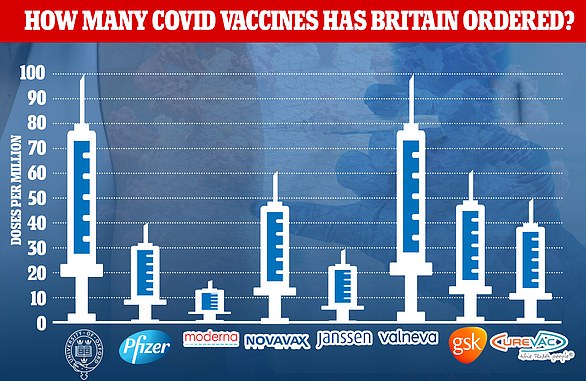Row erupts as Pfizer slaps down Matt Hancock’s claim that supply issues are to blame for slowest ever vaccination day on Sunday after the Health Secretary warns of a quieter week because of ‘ups and downs’ in deliveries
- Health Secretary says a vaccine dip this week is because of ‘supply schedules’
- He says there will be ‘bumper’ weeks in the rollout in March to compensate
- The number of doses dished out each day dipped to below 400,000 yesterday
Pfizer today insisted their coronavirus vaccine deliveries are on track, hitting back at Matt Hancock after he warned supply issues would slow down the roll-out this week.
The Health Secretary claimed a delay in the supply schedule will result in fewer jabs being dished out. But he also said there would be some ‘bumper weeks in March’ to make up for the lag.
Both Pfizer and AstraZeneca — manufacturers of the jabs currently deployed in the UK — say there is no issue with deliveries.
Pfizer sources today told MailOnline there were ‘no supply challenges’ and deliveries were arriving as planned. AstraZeneca yesterday admitted there were ‘fluctuations’ in supply at plants but that it was still ‘on track’ with orders.
Official figures showed Britain only administered 150,000 vaccines on Sunday, in the worst daily performance since the NHS roll-out began to gather speed last month. The number of first doses dished out has dropped by 40 per cent week-on-week.
With a rapid inoculation drive crucial to Britain’s hopes of lockdown being eased in the next few months, critics say there is ‘no excuse’ for the rollout slowing down.
Think-tank bosses believe it is unlikely supply is solely behind the downturn because there would be reports of centres across the country running out of stock — which hasn’t been the case.
Boris Johnson put a successful vaccine roll-out at the heart of his lockdown-easing plan, which he unveiled yesterday. So long as the operation continues successfully, all restrictions could be dropped in England by June 21. Any hiccups could threaten that target.
Britain is racing to give as many first doses to over-50s as possible before the end of March, when millions of second jabs must be rolled out — which will inevitably slow the operation. The PM has pledged to jab all 32million in the top nine groups by April 15 and every adult by the end of July.
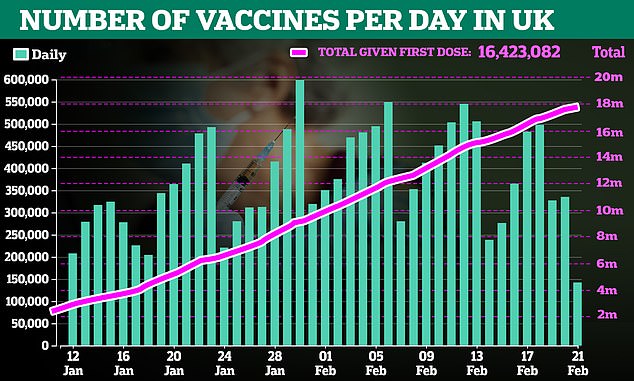
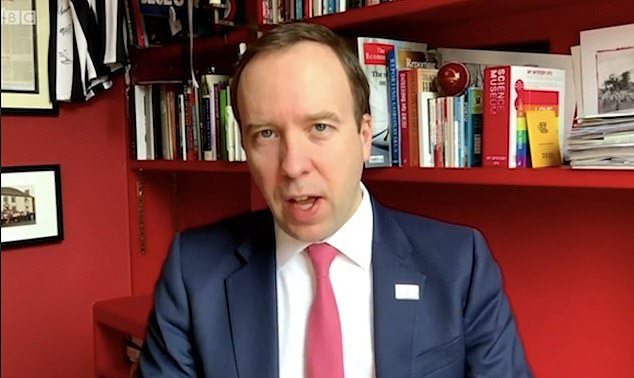
Health Secretary Matt Hancock has warned that the vaccine rollout is going to suffer a dip this week but there will be a bump in March to compensate
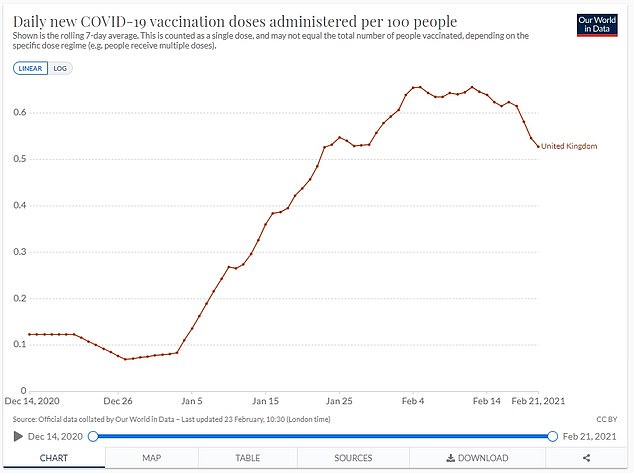
But Department of Health statistics show just 360,000 doses were dished out every day last week, on average. This is down 17 per cent on the rolling average of nearly 435,000 last Sunday. It is the lowest rate since January 22
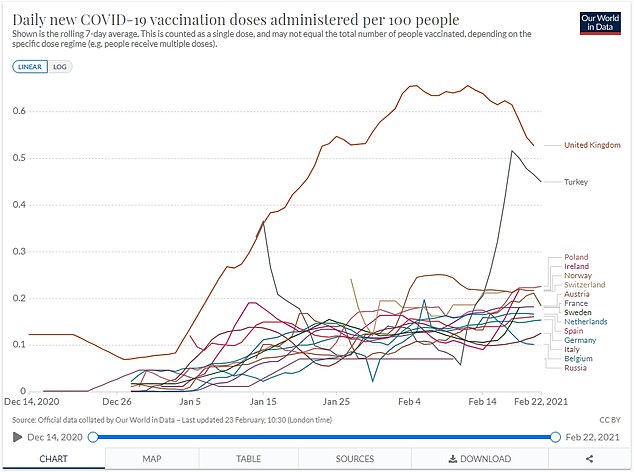
Britain is still jabbing more people for the size of its population every day than other major European nations, even though its drive has slowed
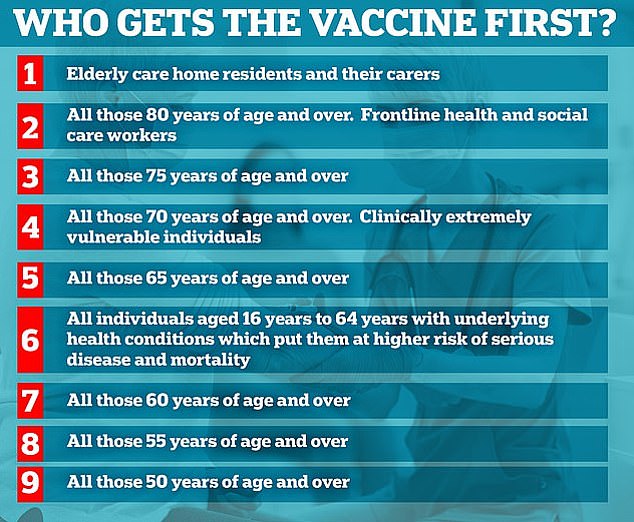
Falling demand may be a result of the Government being too ‘rigid’ about its priority list, said the Francis Crick Institute’s Sir Paul Nurse, with only people in the top four priority groups eligible for vaccines so far – although the NHS today widened it to over-65s in group five
With the UK anxious to rattle through its vaccination programme to stem the flow of Covid deaths and allow lockdown rules to be loosened, ministers have been forced to defend the pace of the rollout as its speed goes through peaks and troughs.
The Government has repeatedly blamed ‘lumpy supply’ and the need to wait for manufacturers for holding back the UK’s rollout as both Pfizer and AstraZeneca had to reorganise their factories in January to scale up their plans.
Ministers have yet to receive any supplies of the other jab approved for use in Britain, made by Moderna, although this is expected to come within the next couple of weeks.
But there are also issues with the rollout process which is also holding the NHS back from hitting its maximum pace, with it already proving it can do almost 600,000 per day.
Some GP surgeries are not offering jabs on Sundays, potentially because they lack a proper incentive on top of spending all week working as normal, critics say.
And some centres have been forced to shorten their opening hours because of a lack of demand for appointments.
Mr Hancock today claimed vaccine roll-out figures will continue to stay low for the rest of this week in an interview with LBC’s Nick Ferrari.
He said it will be a ‘quieter week’ for the vaccine rollout because of a drop in stockpiles, warning that the success of the drive was ‘all about supply’.
Mr Hancock added: ‘We have got a quieter week this week and then we’re going to have some really bumper weeks in March.’
Pointing the blame at vaccine manufacturers, he also claimed there has been ‘ups and downs’ in the delivery schedule.
A spokesman for AstraZeneca said yesterday that although there had been ‘fluctuations’ in supply at plants, they were still ‘on track’ with orders.
Pfizer also confirmed to MailOnline today there were ‘no UK supply challenges’ and deliveries were arriving as planned.
The drug firm did see delays to deliveries in Europe last month because of upgrades to its production plant in Belgium, to ensure it could deliver more doses this year.
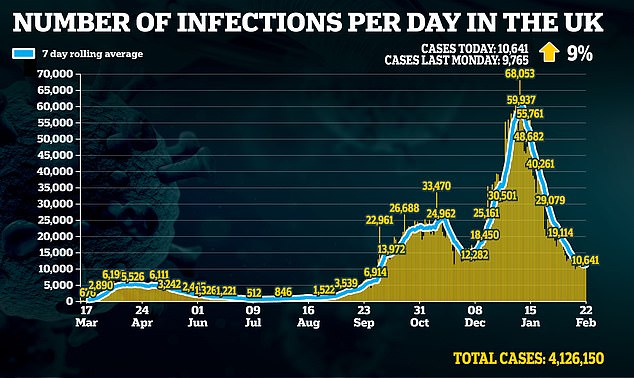
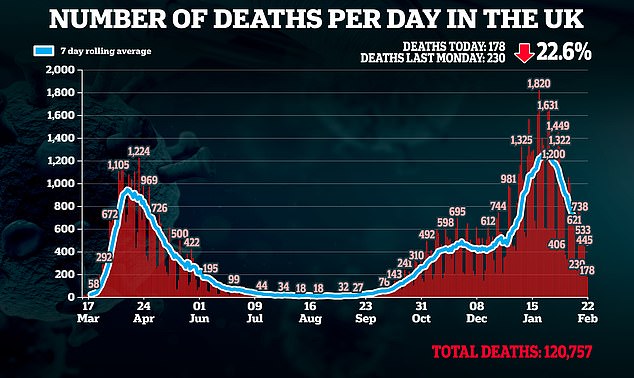
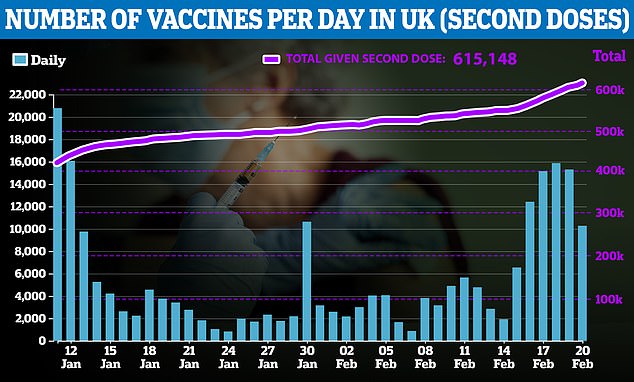
A spokesman said at the time they could confirm the ‘overall projected volumes of delivery to the UK remain the same for quarter one (January to March)’.
Both companies have refused to reveal how many of these doses have already been delivered to the UK.
However, a Pfizer spokesman said it had delivered 21 shipments by early January. It is not clear how many doses were in each shipment.
But Department of Health statistics show just 360,000 doses were dished out every day last week, on average.
This is down 17 per cent on the daily average of nearly 435,000 last Sunday. It is the lowest rate since January 22.
A total of 18.2million Covid vaccine doses have been given out so far, with 17.7million having received their first jab.
Figures reveal there has been an increase in the number of second doses dished out but not at levels high enough to spark any slowdown.
Critics have urged No10 to publish more detailed data on deliveries across the UK, so ‘pinch points’ in the drive can be identified and smoothed out.
James Lawson, a business strategist and fellow at the Adam Smith Institute, said the Government must stop the weekly fluctuations in the roll-out.
‘What we’ve spotted is there seems to be a persistent problem with the number of doses dropping over weekends,’ he told MailOnline.
‘And, while the Government has made huge progress in accelerating the vaccine rollout, there’s no excuse for this variability.
‘The virus doesn’t rest, the virus doesn’t sleep, the virus doesn’t stop at 6pm on a Friday and neither should the vaccine roll-out.’
Mr Lawson, who has written a paper on speeding up the rollout, said it was unclear what was sparking the fall inoculations because of the lack of data.
It was likely that both supply and distribution were playing a role in slowing down the rollout, he added, and that as soon as problems were solved in one area they tended to arise in another.

